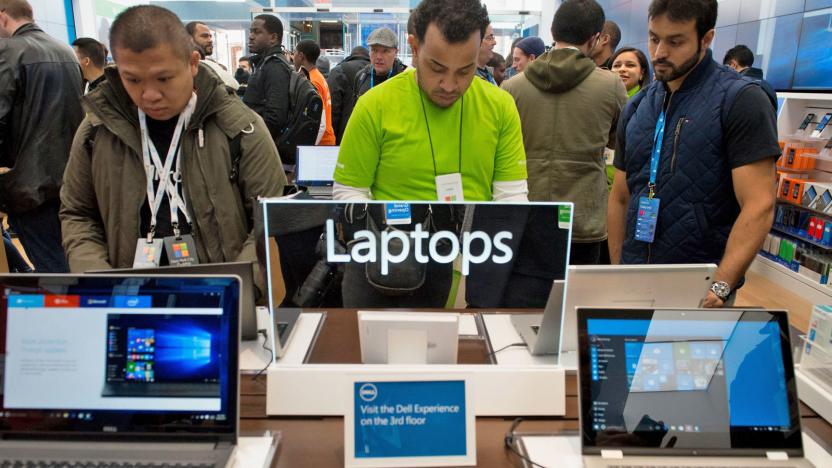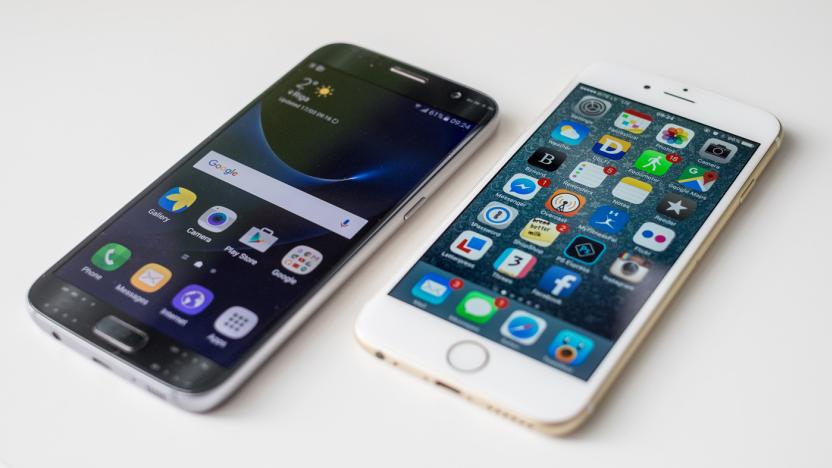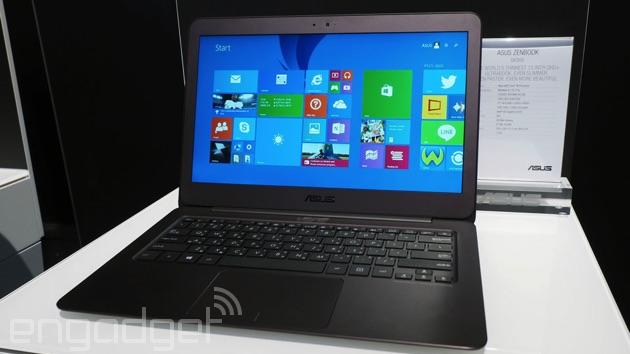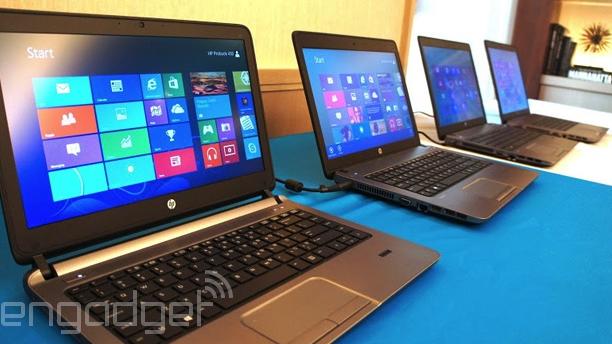IDC
Latest

Without a new Apple Watch, smartwatch shipments decline in Q2
Until now, the smartwatch market had seen year-over-year growth each quarter since the devices made their debut. For Q2 2016 though, that wasn't the case. Global smartwatch shipments were down 32 percent, totaling 3.5 million gadgets during the period. That figure is down from 5.1 million of the wearables shipped during the second quarter of 2015. Apple still led the pack with 1.6 million units, but it was the only top-selling company to experience an annual decline. It's worth noting that Q2 2015 was when the Apple Watch launched and there hasn't been an updated model yet.

PC shipments recover in the US
It's not all doom and gloom in the PC world... for once. Both Gartner and IDC estimate that PC shipments actually grew in the US for the first time in over a year, climbing in the second quarter by either 1.4 percent according to Gartner (which includes Windows tablets) or 4.9 percent if you ask IDC (which doesn't). There's no one answer as to why the computer industry is bouncing back, regardless of who you ask. A stronger US economy is playing a part, but the analyst groups also point to strong Chromebook sales to schools as well as a possible spike in purchases from governments and other public outfits.

Fitbit's lead in the wearable world shrinks due to newcomers
Fitbit has ruled the wearable roost for a while, but it's clear that the activity tracker maker can't become complacent. IDC has released estimates which show that Fitbit lost a significant amount of market share in the first quarter. While its shipments were up 25.4 percent (to 4.8 million), its share plunged from 32.6 percent a year ago to 24.5 percent at the start of 2016. Simply put, the market is much more crowded than it was a year ago -- it has to contend with the Apple Watch, China's BBK and Lifesense, as well as a slew of smaller brands jumping into the field.

The smartphone market is peaking
It's not just Apple taking a tumble in the smartphone market, apparently. IDC has published estimates for first quarter market share which not only suggest that shipments are virtually flat (up a mere 0.2 percent), but that the mobile landscape is changing rapidly. While Apple was the only company in the top five manufacturers to see a big hit, Samsung shrank slightly as well... and even the Chinese contingent is shaking things up a bit. Huawei is still sitting comfortably in third place, but Lenovo and Xiaomi are out of the top ranks -- instead, it's the popular but not-quite-household names like Oppo and Vivo (both owned by BBK) that are storming up the charts.

Detachable tablet sales are taking off
The tablet market might be tanking as a whole, but there's apparently one major bright spot: tablets with detachable keyboards. While IDC estimates that slate shipments were down almost 14 percent year-over-year in the fourth quarter, shipments of detachables more than doubled to 8.1 million. That's about 12 percent of the entire space, folks. Analysts suspect that many people want to treat tablets as PC replacements, and they're willing to pay a premium to make that happen.

PC shipments see their steepest drop ever
Windows 10 might be pretty popular, but it wasn't popular enough to rescue the PC business. IDC estimates that computer shipments actually fell 10.6 percent in the fourth quarter of 2015, making it the steepest year-over-year drop in history. In fact, shipments were scarcely any better than they were in the summer, when sales are supposed to be slower. Gartner's figures are slightly better, although the 8.3 percent drop is nothing to write home about.

Latest IDC wearable numbers show Xiaomi's continued surge
While there was no change in the top two spots for the Q3 2015 IDC wearable numbers, Xiaomi made a staggering jump. In terms of market share, Fitbit is still in the top spot with a 22 percent market share and 4.7 million units shipped in the quarter. The company's numbers were padded by the fact that a number employers are giving their workers Fitbit devices, including Target's order of 335,000. Apple remains at number two, where it debuted in Q2. Cupertino shipped 3.9 million units, aided by both the release of WatchOS 2 and its gadgets going on sale in more locales.

Windows 10 didn't stop PC sales from dropping this summer
Windows 10 may have breathed new life into your PC, but it didn't do anything to juice PC sales this summer. Both Gartner and IDC estimate that computer sales dropped several points year-over-year (between 7.7 and 10.8 percent) in the third quarter, right when the new Windows arrived. That's one of the steeper drops in recent memory, in fact. Not that it comes as a complete surprise. As the analyst firms explain, Microsoft's fast-tracked release left many PC makers shipping existing systems with Windows 10, which weren't going to drive demand as much as brand new models. You're not going to buy a months-old laptop just because it's running new software, are you? The big question is whether or not the wave of new Windows 10 PCs launching this fall will make a difference -- if there's still a sharp decline, the industry is really in trouble.

Apple becomes the second-biggest wearables maker, behind Fitbit
The big question surrounding the Apple Watch is how well it's selling, but Apple isn't saying just yet. Without concrete numbers, we're forced to turn to various projections -- and one of the more reliable sources says that Apple's first wearable is doing well. According to IDC, Apple shipped 3.6 million Apple Watches during the second quarter of 2015; that's good for second place in the global wearables market, behind market leader Fitbit.

China's smartphone market is big, but it isn't getting bigger
China's such a big country that there'll always be an insatiable demand for smartphones, right? Not according to research firm IDC, which believes that the nation's phone market has contracted by four percent in the last year. The outfit's merry band of spreadsheet-wranglers believes that the majority of Chinese people now own a mobile device, and as such, will only buy a phone when they want to upgrade.

The PC market is shrinking again as companies stop upgrading
It's not a good time to be a PC maker... especially if you cater to the corporate crowd. Both Gartner and IDC estimate that the computer market shrank between 5.2 to 6.7 percent in the first quarter of 2015, in part because many companies stopped upgrading from Windows XP. Simply put, many of the businesses that wanted to modernize already have -- they're not propping up the market like they were for a good chunk of 2014. IDC goes so far as to claim that this was the lowest volume of PC shipments since the start of 2009, which is no mean feat given that the world was still reeling from an economic collapse at the time.

iPad sees first full year decline, is definitely (maybe) doomed
According to a new report from analytics firm IDC, 2014 will mark the first time since its launch that the iPad will see a year-over-year decline in sales. Apple's tablet offerings are expected to show a -12.7% growth figure for 2014. Assuming nothing absurd happens in the last few weeks of the year -- like a half-off sale or some other incentive to get people to take up iPads faster than they ever have before -- that sounds about right, especially if you've been keeping an eye on Apple's quarterly reports which have shown sluggish iPad sales for months now. Over the same window, Android and Windows tablets are expected to show 16% and 67% growth rates, respectively. Of course, the iPad's Android competitors have the benefit of budget pricing options and, in the case of Windows, the fact that Microsoft has sold so few in years past makes it easy to post a positive growth figure. So what's the deal with the iPad? We've had Wall Street claiming the iPad needs a life raft for a while now, and while it's certainly true that negative growth numbers aren't ideal, it's important to consider where the dollars that have been spent on iPads in years past have been going in 2014. Spoiler: It's not being spent on an Android or Windows tablet. This year, the iPhone grew up. The iPhone 6 Plus is one of the best (I'd personally say the best, but for the sake of argument I'll hold back) phablets available, and the smaller iPhone 6 still sports impressive screen real estate at 4.7 inches. I personally know two people -- not tech journalists or gadget gurus, but "normals" as the tech world considers them -- who have upgraded their iPhones for the first time since the 4/4s days, decided on the 6 Plus, and traded in their iPads. The 6 Plus, and perhaps even the 6 in some cases, is big enough to satisfy the craving for both a smartphone and a tablet, and I've yet to hear a single complaint from anyone in my life who owns one of these new, larger phones. Well, the U2 album thing did cause some unrest, but that's kind of a special case. This year's iPhone launch saw record sales, and I have to imagine that I'm not unique in knowing at least a couple of people for whom the iPhone 6 makes the iPad more of a luxury than a necessity. Let me stop you before anyone mentions "cannibalization," because I don't think that's the case here; These are people who have seen no reason to upgrade their phones beyond the iPhone 4/4s. The apps they use still work fine and the iPhone 5 size change wasn't dramatic enough to get them to open their wallets. Now, rather than buying a new iPad mini this year and spending yet another 12 months with their ancient iPhones, they're spending their money on the iPhone 6. Then there's the Mac, which is enjoying all-time sales highs this year in the face of an overall decline in PC sales. Is the Mac really just a magic piece of hardware, or is the iPad acting as a gateway drug for people who never considered buying a Mac before? I'd guess the latter, and while some have suggested that Apple isn't doing enough to make the iPad seem like a viable PC alternative, I'd argue that if iPad owners decided to buy a MacBook this year instead of upgrading their iPad, Apple won anyway. So is the iPad "doomed?" If you consider the inevitable wearing off of novelty and eventual desire of iPad owners to invest further in the Apple ecosystem to be a bad thing, then yes. The iPad is definitely doomed. [Photo credit: bbaunach]

Apple is now the fifth-largest PC maker in the world, if you ask IDC
Apple is historically a small player in the PC world compared to many of its peers, but it may have just entered the big leagues. IDC estimates that the company jumped to 6.3 percent market share in the third quarter of the year, making it the fifth-largest PC builder worldwide -- a feat it hasn't managed in decades. It's still no major threat to heavy-hitters such as Lenovo (20 percent), HP (18.8 percent) and Dell (13.3 percent), but IDC believes that a combination of slight price cuts and improved demand in "mature" markets like North America have helped it grow in a computer market that's still shrinking.

Most new Android phones sell for less than $200
Want to know a big reason why Android smartphones are virtually ubiquitous these days? Because many of them are very affordable, that's why. IDC's latest market share estimates show that 58.6 percent of Android phones shipped in the second quarter cost less than $200, many of them from surging Chinese manufacturers like Huawei, Lenovo and Xiaomi. Simply speaking, many in China and other developing countries can't (or won't) justify buying the expensive phones that thrive in regions like Europe and North America. It's no wonder that Samsung is losing the battle at the moment, then -- while the company has budget handsets, it's heavily invested in high-end hardware like the Galaxy S line.

Samsung's phone market share takes a bruising as Chinese rivals surge
Samsung warned that its smartphone sales weren't that great this spring, and now we have the numbers to show just what the company meant. IDC estimates that Samsung's smartphone shipments saw a rare year-over-year drop in the second quarter, taking it from a lofty 32.3 percent market share down to 25.2 percent. That's still enough to give it a comfortable lead, but a shock for a company which is used to growth. The cause, analysts say, is the rapid rise of Chinese brands that cut directly into Samsung's low-end business. Huawei claimed 6.9 percent of the smartphone space after doubling its shipments, thanks in part to heavy discounts on phones like the Ascend P7; Lenovo jumped to 5.4 percent on the back of both budget phones at home as well as rapid expansion abroad.

PC shipments appear to flatten out after two years of steep decline
Both Gartner and IDC appear to have some good news for the PC industry -- the seemingly never-ending death spiral may have come to an end. While the two research groups don't agree completely on the numbers, it does appear that after two years of stead and sizable declines, the PC industry is seeing shipments flatten out. In total, according to Gartner, 75.8 million computers were shipped in the second quarter of 2014, a negligible 0.1 percent drop from the same quarter a year ago. While IDC saw a much more sizable 1.7 percent fall in PC shipments, that's still a far cry from the 7.1 percent decline it anticipated and the smallest it's measured in two years.

The danger of using bogus IDC marketshare predictions to declare "Apple is losing to Android"
As anyone who follows the tech market closely can attest, marketshare predictions rarely play out as anticipated. To borrow a phrase from the political sphere, you might say that marketshare predictions are like cologne; fun to smell but dangerous to drink. Yet the blogosphere, for reasons that often defy explanation, are quizically all to eager to drink the empty and often contradictory marketshare predictions trotted out by an assortment of research firms. Normally it's easier to let comically vapid predictions pass on by, but when I stumbled upon a widely dissmineated Business Insider article that was picked up by both the AP and Yahoo Finance, I figured it was time call BS on the outlets that refuse to take IDC predictions with the requisite grain of salt. The article in question has a typically linkbait-esque headline, titled "The iPhone 6 Had Better Be Amazing And Cheap, Because Apple Is Losing The War To Android." I'll give you all a few seconds to finish rolling your eyes. Okay, welcome back. Now the basis for the article is an IDC research report which anticipates Apple's share of the smartphone market in 2014 will fall from 18% down to 14% while Android's share will increase from 78% to 80%. Looking even further out, IDC expects iOS marketshare to drop down even further by 2018 on account of growing Windows Phone sales. Now the problem with these marketshare predictions is that the technological landscape is moving far too fast for anybody to really make informed predictions about what the next five years will look like. It's why sportswriters don't predict who might win the NBA championship in 2018 -- there's simply no point. Players get traded, new stars emerge, the skill set of current stars may decline prematurely, injuries happen. In short, there are far too many variables and unknowns to take into account. The same applies with these smartphone marketshare predictions. As further proof, it's helpful to go all the way back to 2011 and see what IDC believed the 2015 smartphone market would look like. Funny, huh? In 2011, IDC's 4-year projection put Windows Phone marketshare at 20.9%. During the fourth quarter of 2013, Windows Phone sales occupied a 3.2% share. That's a huge miss, but not nearly as egregious as their prediction that BlackBerry in 2015 would enjoy a 13.7% marketshare. Today, IDC's marketshare forecast barely touches on BlackBerry as the handset maker's marketshare is now, by IDC's own estimation, at 0.6%. A lot can happen in four years. Think about it -- Tony Fadell now works at Google, Dr. Dre now works at Apple, and Steve Ballmer is no longer Microsoft's CEO but rather the owner of the LA Clippers. It's wild stuff, which is why following the tech industry is such an interesting endeavor. But in following the industry and churning out headlines that typically paint Apple as a company in dire need of help, outlets are doing their readers a disservice by not taking into account the quality of the messenger before relaying the actual message. As a final point, keep in mind that the fight for marketshare is obscenely overrated. Actual profits are much more important as marketshare figures are easily manipulated. To wit, RIM a few years ago began rolling out widespread "Buy 1 get one free!" deals for their devices. The result was an artificially inflated marketshare figure that belied the true market interest in BlackBerry devices.

Lenovo overtakes Apple in US PC sales for the first time
Apple has rightly made a big deal of the fact that its Mac sales have continued to grow, in spite of a contracting PC market. But Cupertino certainly isn't alone in having figured out how to win at desktops and laptops: Lenovo has just reported big gains in its full-year revenue and profits, and it claims that its PC shipments in the US overtook Apple's for the first time, grabbing the No. 3 spot behind the more stagnant giants, HP and Dell. This claim is based on data for the last three months, likely with a bit of help from analysts at IDC, although it's worth pointing out that Gartner still had Lenovo in fourth place in the US as recently as April. Whichever pundits you listen to, Lenovo has now dominated the PC market globally for around a year, thanks to its ever-expanding ThinkPad line, while also growing its non-Windows tablet and smartphone sales -- with the latter soon to become a lot more prevalent in the US now that the company owns Motorola.

Tablet demand hits a wall as many are happy with the devices they own
It looks like Apple wasn't the only tech firm to see its tablet business take a hit this winter; according to IDC, others suffered a similar fate. The analyst group estimates that overall tablet shipments grew just 3.9 percent year-over-year in the first quarter, a sharp contrast with the breakneck pace of the past few years. Amazon took a particularly severe blow, as its shipments dropped almost 50 percent. So what prompted the suddenly chilly market? If you believe researchers, many are happy with the devices they've got -- they either have a good-enough tablet or a big-screen smartphone that will do in a pinch. Simply put, there was no compelling reason to splurge on something new.

Death of Windows XP can't quite reverse slowing PC sales
The official end to Windows XP support may have sent many companies into a panic, but it was good news for PC manufacturers this winter... well, sort of. Both Gartner and IDC report a big increase in PC shipments during the first quarter thanks to companies scrambling to replace old XP computers at the last possible moment. However, the two analyst groups note that the sudden spike only managed to soften ongoing declines in PC shipments, rather than reverse them. Depending on which research firm you ask, the number of PCs on the market dropped between 1.7 percent to 4.4 percent year-over-year. That's better than what system builders have seen over most of the past two years, but it's not exactly a recovery.







